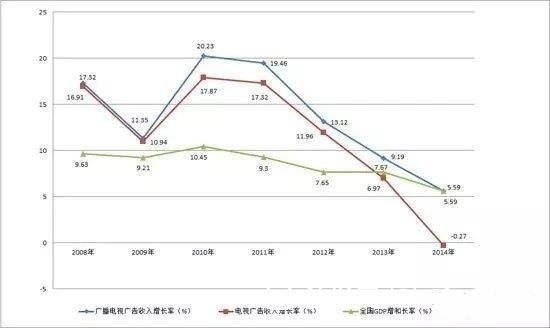At present, there are already some signs of this prediction. The revenue from advertising on traditional television stations has already fallen into a global situation. In the United States in the past 10 years, only advertising revenues in 2011 and 2012 have continued to grow. The advertising revenue of Chinese TV stations has also shown a declining trend in recent years.

I am afraid that it will not be as long as 2030. It may be 5 to 10 years or even shorter. So the Netflix CEO mentioned at the beginning of this article may be too optimistic about the TV station.
Of course, not all TV stations will die out collectively. This process will not be sudden and radical. It will be a gradual, warm boiled frog process.

First, the first-line television station may become the same as the six major US groups. There will be a Matthew effect in the TV industry. Even if the entire industry starts to decline, there will still be stronger players and weaker players. For example, television stations of the first tier of Hunan, Jiangsu, Zhejiang, and the East will be expanded into mergers and acquisitions and become new media groups.
Secondly, it is second-line satellite television, headed by Anhui, and other second-tier cities such as Shandong and Beijing. These are either going to be vertically oriented, or they are looking for opportunities to get into the first camp, or they will recede into the third camp.
In the end, the rest are all third-tiered teams, basically buying shells. For example, Qinghai, Inner Mongolia and Hainan have all sold their shells.
What forces have led to the demise of television stations?
1. The impact of Internet video websites has taken away the only advantages of TV stations
In 2015, the TV series ushered in the most powerful alternative in its lifetime: the online drama.
In fact, the cyber drama has existed for several years, but it has become a real climate, and it poses a threat to TV dramas in 2015, and in 2016 it has formed a scale advantage. What is even more powerful is that the cost of a single play of a net drama is more than a million yuan, which is equal to or even more than the cost of mainstream TV dramas.

In addition, letting video sites dare to take risks is the rise of super IP, as long as there is a large IP, it can attract the stars that could not be attracted in the past to shoot online dramas, which in the past was unimaginable. Former stars have generally felt that the drama is too LOW, but now the cyber drama has become a symbol of a young generation. Stars are not only not exclusive, but they also regard it as a powerful means of attracting young audiences.

The video site super-television drama and "first network backstage" are all sharp weapons that pierce the heart of television stations. If you've said that you've only been playing in a small way before, then this time it's fatal.
The essence of a TV station is "to gather people": to maximize the audience's attention at the same time period to form a hot event, so that advertisers are willing to pay. The Internet video website is "following" and distinguishes different types of content from different types of viewers, and then makes every effort to meet the needs of the audience.
But once the Internet has cut its hot spots from its roots, the last point of the television station has no advantage. The only advantage of TV stations is the large screen. In the era of mobile Internet, people pay more attention to mobility and use mobile phones to watch anytime, anywhere.
When the video site no longer satisfies the loose content model of UGC, once it begins to make big productions and faces competition with the TV station, the TV station can't stand it.
The video site was previously only supplemented by television stations and is now clearly counter-offered. The income of first-line video websites such as Youku and iQiyi has reached billions of dollars a year, which is already the body of first-line TV. As video sites grow far faster than TV stations, their body size will increase.
Therefore, in the long run, in the future, video websites will either acquire TV stations or they will use TV's shell to build TV stations themselves, or even directly kill TV stations to make TV stations marginalized and become television stations for the elderly.
For the TV station, all the broadcast modes that may be possible for Focus are worthy of vigilance and are a disaster. In particular, the “small fresh meat†and “first net backstage†models of television stations are all about drinking and quenching thirst, and they are completely digging their own grave.
2. “One play and two stars†drove up the costs of TV dramas. Second-line and third-line TV stations could not afford television dramas.
Many people have always hoped that domestic TV dramas can be as high quality as American dramas. However, the cost of a US$10 million US TV drama set was far behind Chinese TV stations. This also reflects from the side, the current cost of Chinese TV shows is not too high, but too low.
In the future, the single integration of Chinese TV dramas is bound to increase. After the TV stations can form a monopoly like the United States, they will eventually form a "super-television drama" like a super-television drama.
Therefore, Chinese TV stations will go to the same concentration as the United States, and Chinese TV dramas will gradually rise and rise toward the finesse like the American drama.
Even now, domestically produced TV dramas are still investing more than 200 million yuan in investment costs. One episode sells more than 3 million, and even sells more than 5 million. This is the price that the average three-line TV cannot afford at all. Second-line TV can only afford it occasionally.
This will be thanks to SARFT's "one play and two stars" policy. In the previous four-star drama, small TV stations could also use the 500,000-per-set episode for each episode. Therefore, some people ridiculed that the leadership of SARFT was the undercover video website and was the biggest contributor to the death of a television station that had formed a monopoly.

In addition, if there is no money, it can only arrear movies and television companies to purchase money. So even if it is affordable, the film and television company does not dare to sell.
Television stations and good content are all glorious and glorious. Instead of monopolizing the channels, the relationship between fish and fish can be arbitrary. All the policies and restrictions that would cause the content provider to suffer damage are the TV stations digging their own grave.
3. The loss of high-end talent in the television system
The core of the entertainment industry is not so-called strong channels but talents.
In the past, most of the best-in-class talents were in the TV station system because political monopolies formed a strong platform, and the halo of the strong platform will continue to attract high-end talents.
However, in recent years, the advantage of the strong platform of TV stations has not taken place, and natural high-end talents have begun to lose. For example, Chen Xiao, Ma Dong, Xie Xiaokui and others. They either start their own businesses, either on video sites or in movie companies. Even when the internal elites are not optimistic about the future and dare to voluntarily lay off or go to sea, it proves that the TV station is really going downhill.
For high-end talent in the system:
First, once the station’s wages plus the grey income are not as good as being bright and bright under the market economy, it is natural to go out.
Second, the advertising revenue of television stations has shrunk and the situation has become increasingly difficult. On this platform, in addition to less money, it is even more difficult to achieve power and ambition, naturally going out.
Third, when an industry begins to decline as quickly as PHS and SMS, leaving the employees' income and status far lower than those of other industries, they naturally have to go out.
Perhaps one day, even when Hong Da, such as Hunan Satellite TV, resigned, it was the critical point for the complete decline of traditional television stations.
Smart TV/box information can focus on smart TV information network sofa butler (http://), China's influential TV box and smart TV website, providing information, communication, TV boxes, smart TVs, smart TV software, etc. Answering questions.
Mobile Phone Support Middle Plate is the important accessories for mobile phone and also is a key part of the sandwich structure of a mobile phone. It supports and carry the key components of the core, which has many requirements in terms of strength, structure and heat dissipation.
We custom Phone Plate Frame with drawings provided by customers. The raw material we use for etched Phone Support Middle Plate is SUS304 stainless steel. We are equipped with professional metal etching equipment and exposure development equipment. We have fine metal etching technology and can guarantee that our products have high precision.
SUS304 Customized Logo,Diverse Patterns Customized Logo,Etched Phone Support Middle Plate,Custom Phone Plate Frame
SHAOXING HUALI ELECTRONICS CO., LTD. , https://www.cnsxhuali.com